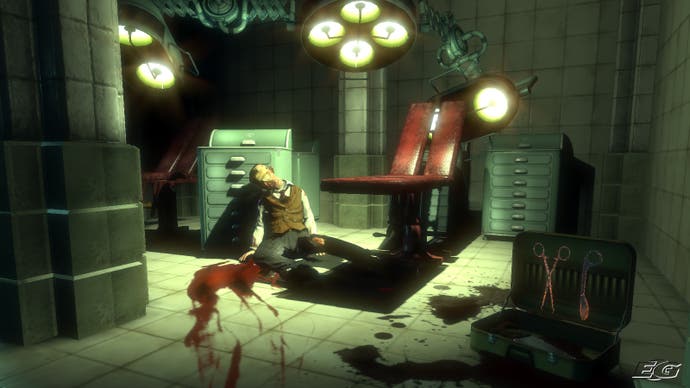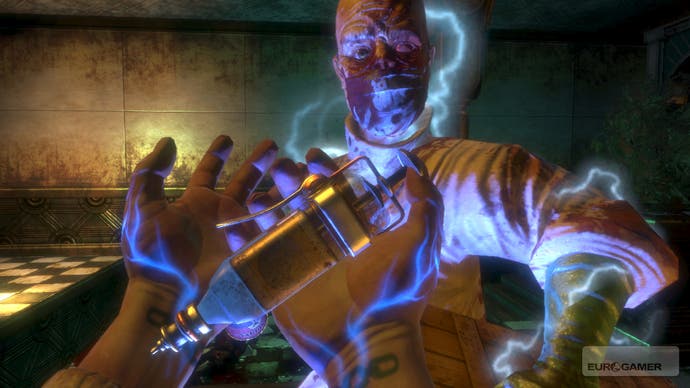Building BioShock
Ken Levine, Bill Gardner and Chris Kline on narrative, creativity, controversy.
I think it's more about finding ways to present that sort of stuff. We're not really limited in any way. Obviously, it would be liberating and easier for us to do cut-scenes to get all the stuff across... But no, I can't think of any point where we were held back.
It's about how. How do we get this idea across? We beat on it until we find the way to get it across within our toolset. I don't think we've ever thrown away an idea, saying there's no way we could possibly express it. I think that shows a lack of intellectual rigour on the developer's part - you have to be able to say, does my idea have to be exactly the way I'm thinking about it, or is there another way to show this?
This is how development works. You have an idea, and I go to Chris or Bill and they say, "well, dude, that's f***ing crazy" - and we sit there and we talk about it until we find a way to get the idea across.
It's one of the great things about working with this team. The design team comes up to me with something crazy they want to do, and I'll say, technically, we can't do exactly that. What's interesting to me is that they'll then say, okay, well here's what I'm trying to get across to the player - how can we present it in a different way? It's a great experience to have that sort of back and forth. When you work with people who are focused around an idea, rather than a particular scene or a particular special effect, it can be really liberating.

This is an interesting thing... Let me preface by saying that the gamer is always right. If that is their opinion, they're totally entitled to their opinion - and I'm not here to argue an opinion. However, I think this is a matter that's modulated by perception.
If you take BioShock and compare it to other first-person shooters - and we're always very clear that this is a shooter, first and foremost - it's in general, less linear than most first person shooters, like Call of Duty, Half-Life, stuff like that. The feature-set is pretty substantially different, in terms of stuff like the plasmid system, hacking, taking control of bots, the Big Daddies and Little Sisters, passive gene tonics, all the min-maxing that's involved...
It's not World of Warcraft level by any stretch, and we never present it that way, but we really didn't show a lot of that stuff because we didn't want to get across the idea that there is a WoW level of complexity at work here. If you think about the missions, whether it's the residential area, Olympus Heights, or the Medical Pavilion - compare it to a CoD level or a Half-Life level - it's actually far less linear than those levels. Now, I'd say that the mission structure is pretty linear.
Grading on a curve, or relatively to other products, I think it is... I don't quite understand that criticism. I don't invalidate it, because people...

This is interesting too, because if you play System Shock 1 compared to System Shock 2, for instance... System Shock 1 is actually a pretty straightforward shooter. There's not a lot of characters - we added a lot of that in System Shock 2. So I think if you compare it to SS1, it's quite a lot more systemically complicated. Not in interface terms - interface has come a long way since then. I say this as the biggest fan of System Shock 1 ever - I got to make the sequel! It was awesome!
As for Shock 2, I'd certainly love for someone to lay out the systems side by side. Is it really - and I'm really trying to be genuine here - is it really less complex than Shock 2? I don't know...
I don't know if it's about that. I mean, I'm just as baffled as you...
I'm really curious to know. I want to figure this out.
To me, when I look at shooters in the past ten years - and that's what we are - I look at Halo, where you get the cover system, the recharging health, and all that. Those are the big things. You go to Call of Duty - they were the first game with iron sights, I think, or maybe Medal of Honor. Iron sights was a big thing, they made it into a core mechanic where it was all about shooting from the hip versus going into iron sights.
To me, BioShock is the first shooter that really introduces combos. It's almost like a fighting game in some senses - you've got the one-two punch, you've got this plasmid and that weapon, and all this creative, improvised gameplay. I may be overstating, and I'm obviously too close to it - to me, I view it as pretty innovative in that sense, but obviously the gamers are the ultimate arbiters. Judge, jury and executioner! [Laughs]
I think there's less up-front presentation of complexity in the UI, and I think that's where it comes from. The systems are just as complex - it's just that we hide the drudgery of having to deal with over-complication.







